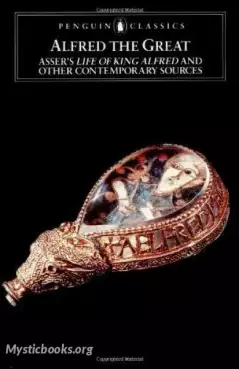Asser
Asser was a Welsh monk from St David's, Dyfed, who became Bishop of Sherborne in the 890s. About 885 he was asked by Alfred the Great to leave St David's and join the circle of learned men whom Alfred was recruiting for his court. After spending a year at Caerwent because of illness, Asser accepted.
In 893, Asser wrote a biography of Alfred, called the Life of King Alfred. The manuscript survived to modern times in only one copy, which was part of the Cotton library. That copy was destroyed in a fire in 1731, but transcriptions that had been made earlier, together with material from Asser's work which was included by other early writers, have enabled the work to be reconstructed. The biography is the main source of information about Alfred's life and provides far more information about Alfred than is known about any other early English ruler. Asser assisted Alfred in his translation of Gregory the Great's Pastoral Care, and possibly with other works.
Asser is sometimes cited as a source for the legend about Alfred's having founded the University of Oxford, which is now known to be false. A short passage making this claim was interpolated by William Camden into his 1603 edition of Asser's Life. Doubts have also been raised periodically about whether the entire Life is a forgery, written by a slightly later writer, but it is now almost universally accepted as genuine.
Background and Time Period:
Asser lived during the late 9th century in England, known as the Anglo-Saxon period. This era was marked by political turmoil, Viking invasions, and the emergence of a unified kingdom under King Alfred.
Literary Contribution:
Asser's most notable literary contribution is "The Life of King Alfred," a biography chronicling the life and accomplishments of King Alfred the Great. This work provides valuable historical details about Alfred's reign, his military campaigns, and his efforts to promote education and literacy.
Literary Style and Techniques:
Asser's writing style is straightforward and informative, emphasizing the factual account of events rather than embellishment. His prose is characterized by its clarity and objectivity, focusing on the accomplishments and character of King Alfred.
Themes and Philosophies:
The primary theme in Asser's writings is the portrayal of King Alfred as a heroic and virtuous ruler. Asser highlights Alfred's commitment to education, his efforts to defend the kingdom against Viking invasions, and his promotion of justice and Christian values.
Historical and Social Relevance:
Asser's writings offer valuable historical insights into the reign of King Alfred and the challenges faced by the Anglo-Saxon kingdom during the Viking Age. His works shed light on the political, social, and cultural climate of the time.
Legacy and Influence:
Asser's biography of King Alfred remains one of the most important sources for understanding the life and reign of this influential monarch. His writings have contributed to shaping our understanding of the early medieval period in England.
Personal Life and Biographical Details:
Not much is known about Asser's personal life beyond his association with King Alfred. He was a monk and likely served as a counselor and scholar in Alfred's court. Asser's position as a monk allowed him access to important information and events during Alfred's reign.
Critical Reception:
Asser's writings have been widely studied and cited by historians and scholars interested in the Anglo-Saxon period. While there may be debates regarding the accuracy and reliability of his accounts, Asser's work remains a valuable historical source for understanding the life and reign of King Alfred.
Although Asser's biography of King Alfred is his most significant contribution, his writings offer valuable insights into the cultural and historical context of medieval England. His work provides a glimpse into the life of one of the most important Anglo-Saxon kings and contributes to our understanding of this fascinating period in history.
Books by Asser

Life of Alfred the Great
In the annals of history, there are figures who transcend the boundaries of their time, shaping the course of nations and leaving an indelible mark on the tapestry of their era. Among them, none shine as brightly as Alfred the Great, the visionary ru...
